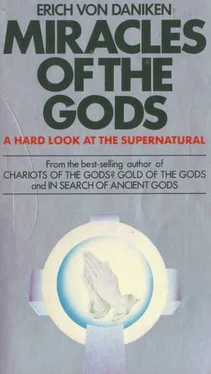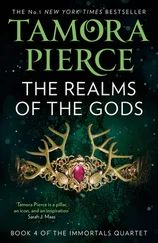Erich Daniken - Miracles of the Gods
Здесь есть возможность читать онлайн «Erich Daniken - Miracles of the Gods» весь текст электронной книги совершенно бесплатно (целиком полную версию без сокращений). В некоторых случаях можно слушать аудио, скачать через торрент в формате fb2 и присутствует краткое содержание. Жанр: Физика, на английском языке. Описание произведения, (предисловие) а так же отзывы посетителей доступны на портале библиотеки ЛибКат.
- Название:Miracles of the Gods
- Автор:
- Жанр:
- Год:неизвестен
- ISBN:нет данных
- Рейтинг книги:4 / 5. Голосов: 1
-
Избранное:Добавить в избранное
- Отзывы:
-
Ваша оценка:
- 80
- 1
- 2
- 3
- 4
- 5
Miracles of the Gods: краткое содержание, описание и аннотация
Предлагаем к чтению аннотацию, описание, краткое содержание или предисловие (зависит от того, что написал сам автор книги «Miracles of the Gods»). Если вы не нашли необходимую информацию о книге — напишите в комментариях, мы постараемся отыскать её.
Miracles of the Gods — читать онлайн бесплатно полную книгу (весь текст) целиком
Ниже представлен текст книги, разбитый по страницам. Система сохранения места последней прочитанной страницы, позволяет с удобством читать онлайн бесплатно книгу «Miracles of the Gods», без необходимости каждый раз заново искать на чём Вы остановились. Поставьте закладку, и сможете в любой момент перейти на страницу, на которой закончили чтение.
Интервал:
Закладка:
I know of no earlier medical-cum-scientific documentation of a 'case' like the one Dr. Justinus Kerner described in the two volumes which are now nearly 150 years old. As doctor and scientist he first examined the phenomena of Friederike Hauffe as a clinical picture of illness: he went into her childhood and origins, living conditions and habits. He wanted to get to the heart of the matter. The final conclusion he came to after all these efforts was that the state of magnetic sleep released special visionary abilities. He examined every case of precognition, which to him verged on the miraculous, with an accuracy and persistence that would do credit to' Scotland Yard. Out of dozens of examples I shall describe one of the cases Kerner recorded: On 25th November, 1826, Friederike Hauffe entered Kerner's house in Weinsperg. She did not know the town and had no acquaintances there. The house was on the same level as and not far from the Law Courts. A certain K, who had died in the house some years previously, had managed the affairs of a Mr. F very badly, so that the 'business had gone bankrupt'. Mrs. Hauffe said, in a magnetic sleep: That man F is there again, disturbing me ... what is he showing me? A page, not quite as long as a folio, covered with figures. The upper right-hand corner is folded slightly, in the left-hand corner there is a figure ....This page lies underneath a lot of documents; no one takes any notice of it. He wants me to tell my doctor and through him to issue a warning .... This page lies in a building that stands sixty paces from my bed. In it is a large, then a small, room. In the latter a tall man sits working at a table.
He goes out and now he is returning. Beyond this room there is an even larger one with longish chests in it. I see a cupboard that stands at the entrance and its door is somewhat open. ... Above on the table there is something made of wood ... and on it lie papers; I see them lying in three piles .... In the righthand pile there is nothing of this man's, but in the other two I feel from him, to be precise in the centre one, a little below half-way down, that page which torments him so.
Kerner recognized the high court from the building she described, but took her vision for a dream image. Mostly to pacify his patient, for she was constantly plagued by the story, he went to the judge, who was staggered because at the moment described he had actually gone into another room and then returned to his place.
The apparition returned; the data became more and more precise. Kerner and the judge examined the
'pile of files' which Mrs. Hauffe had described so vividly. They got the sort of surprise a police inspector would not hope for in his wildest dreams. 'We found in an envelope a page just as the visionary had described it with figures and words in the hand of that man ... (whom Mrs. Hauffe had
'seen'). ... This page contained a proof, the only one, that K had kept a secret book, which was not found after his death, in which he had apparently entered a great deal that never came to light....'
In a sleep-waking state Friederike Hauffe dictated a letter to the dead man F's wife telling her she was innocent and could face the bankruptcy confidently. The judge prepared a conclusive official statement of the whole business. Frau Hauffe seemed to be revivified after the long drawn out affair.
On 5th August, 1829, the visionary of Prevorst died in exactly the way she had predicted in a magnetic sleep on 2 May.
How could that outstanding doctor Justinus Kerner sense or know about the conclusions of modern psi research 150 years ago? What could he know about the conversion of energy/time? For what else appeared to the visionary but the conscious energy of the dead Mr. F, who wanted to help his wife in her imminent bankruptcy? Who else besides Mr. F knew about the bundle of files and the letter which played a decisive part in the proceedings?
The case described by Kerner is more than clairvoyance: it is exact knowledge of an event. We can understand why Kerner's account still keeps on appearing in modern scientific literature. It established standards for carrying out experiments and evaluating results. The visionary's message that she received all her impressions and visions from a 'nerve spirit' runs like a leitmotiv through all the accounts. I should like to posit boldly that Kerner supplied the first 'proof of my theory that conscious energies seek the media appropriate to them - and find them!
Mankind cannot complain about a shortage of prophets and their frightening communications. We must have hindsight to understand why the prophecies which every now and then have exploded like thunder in history always announced disaster. For why should otherworldly conscious energies make contact with terrestrial ones simply to spread happiness and joy? 'Children, it's a wonderful age!
Rejoice! Taxes are going to be reduced! In twenty years' time you will still own what you do today!
Love each other, for no shadow will fall on your lives! Disarm, there will never be any more idiotic wars!' The energetic news apparatus would hardly be set in motion for cheerful messages like that.
The 'spirits above' still exclusively transmit, as they have always done, descriptions of imminent catastrophes, world destruction, misery and famine. A wretched job for a messenger, but who warns anyone about happiness?
What does even a brief glance at the annals of visionaries 'reveal'?
The itinerant Greek priest Peregrinus Proteus at first preached the doctrine of Christianity; then he had doubts and changed his philosophy. He became a cynic, one of those philosophers who cultivated the ideal of frugality to the point of folly. The convert was not happy. He 'saw' - and as a preacher naturally told everybody - that mankind was on 'the brink of annihilation'. As he did not want to take part in this mass disaster, he logically burnt himself to death during the Olympic games in 165.
The Phrygian prophet Montanus (156) belonged to an early Christian sect which aroused among people a brief-lived hope of the imminent return of Jesus. In order to be well prepared, the prophet exhorted his followers to practise rigorous asceticism, for otherwise 'the end of the world was at hand'.
In 140 the Roman apostolic father Hermas in his book 'The Shepherd' (which formed part of the New Testament for a time) called on Christians to do penance as the ultimate salvation 'from the imminent Last Judgment'.
Over 400 years ago (1568) the Provencal plague doctor Michael Nostradamus (1503-1566)
posthumously published his book Les Propheties [17]. His prophecies, extending down to modern times, which in the opinion of scholars tally with recorded facts, consist of a non-stop list of wars, pestilences and disasters. The fact that most of the events are supposed to have taken place according to plan is small con solation.
If we made ourselves a present of a collected volume of prophecies it would be as thick as a New York telephone directory, and poring over disasters is no fun - especially if we've got them at home! But it is fun to meet and talk to a living prophetess.
Jeane Dixon is an American from the wealthy middle-class She lives in a white-brick terrace house in Washington, D.C., is happily married to her husband Jimmy, a smart businessman, She loves her cat Mike, dresses fashionably and is Secretary-Treasurer of James I. Dixon & Co., a real estate firm. After ten hours at the office, she writes columns for 200 American dailies, receives an average of 3,000 letters a week and gives lectures, in addition to her social activities as a company representative. She has calculated that she works 217 days more than her fellow-citizens: 52 Saturdays, 52 Sundays, 9 holidays (except Christmas), 14 days' holiday (which she does not take) and 90 days' overtime. Jeane Dixon has a sense of humour and is deeply religious.
Читать дальшеИнтервал:
Закладка:
Похожие книги на «Miracles of the Gods»
Представляем Вашему вниманию похожие книги на «Miracles of the Gods» списком для выбора. Мы отобрали схожую по названию и смыслу литературу в надежде предоставить читателям больше вариантов отыскать новые, интересные, ещё непрочитанные произведения.
Обсуждение, отзывы о книге «Miracles of the Gods» и просто собственные мнения читателей. Оставьте ваши комментарии, напишите, что Вы думаете о произведении, его смысле или главных героях. Укажите что конкретно понравилось, а что нет, и почему Вы так считаете.











